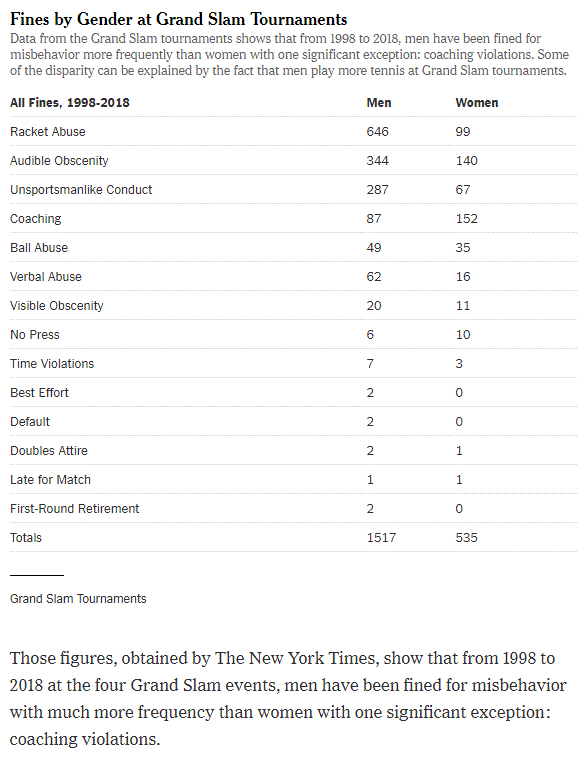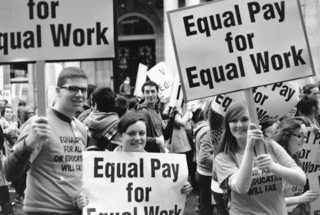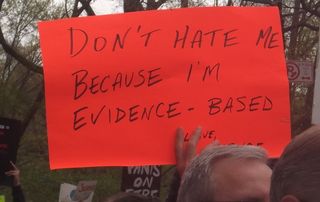Bias
Serena Williams and Unjustified Charges of Racism & Sexism
Bad behavior all around.
Posted September 19, 2018
Serena Williams lost the US Open final. Media (both conventional and social) went nuts with, on one hand, accusations of sexism and, racism, and on the other, responses saying Serena broke the rules and got what she deserved when, she was warned once and penalized twice for bad behavior.

In this essay, I try to bring some measured consideration to this discussion. And some relevant data. This was especially fun for me, because it combines my scholarly interests in prejudice and political biases with a sport I have loved and played in for over 30 years (including over 20 trophies from amateur tournaments).
The Facts
Naomi Osaka beat Serena Williams in the Finals of the US Open Tennis Tournament. Score was 6-2, 6-4.
Serena is probably the greatest women’s player in history, and Osaka was, to many, a young unknown. To tennis fans, however, this was not all that surprising – many close followers predicted that Osaka, a young rising star, had a bona fide shot. Plus Serena had a baby only a year earlier, and it always takes time for professionals to get their games back. And she’s 36.
In the second set, Serena was warned by the umpire, Carlos Ramos, for a coaching violation. Her coach was giving her playing signals, which, in Grand Slam tennis, is illegal. After blowing a game in which she was ahead by double faulting twice, Serena smashed her racquet. This is also illegal. In tennis, two such violations result in loss of a point. Serena was penalized a point, and went on to lose that game.

Serena then went on to more or less continuously berate Ramos, especially on changeovers. She eventually topped her various tirades off by calling him a “liar and thief.” He penalized her again for abuse. A third such penalty resulted in her loss of an entire game. At that point, she went down 5-3, and went on to lose to Osaka.
The Accusations
Media (social and traditional) went nuts with accusations of sexism and racism. Everyone from Billie Jean King (who later massively walked back her initial accusations) to a whole stable of academics, especially on Twitter leveled charges of prejudice of one type or another (see this thread for an example).
Let’s unpack them and also bring in some evidence.
The Sexism Accusation and Evidence

The idea here was that women are sanctioned for bad behavior more readily than men. Women are, according to this view, socialized and sanctioned into passive roles, so that expressions of aggression, or even assertiveness are more likely to be punished by those in power, perhaps especially by men.
The core problem with this accusation is that, even if true, it is utterly irrelevant to the fairness of the match. Why? Because both players were women. There are many different rules for women than for men (e.g., women only have to win two sets to win a match, whereas men have to win three). However, as long as the rules applied to Serena and Naomi equally, the match was played under fair conditions. Inasmuch as the sexism charge would only create unfairness in a match involving men versus women, even if it is true, it is entirely irrelevant to this match.
Is it true? No one has any evidence that bears on this in any definitive way. Anyone claiming they do is making stuff up.
What the evidence shows is that men are penalized about three times more frequently for aggressive infractions than are women in Grand Slam tournaments. Of course, men play about 50% more tennis, and the more people play, the more they will be penalized, all other things being even nearly equal. Still, this would mean men would be penalized twice as often as women for comparable playing time.

One of the reaction to this goes something like this: "Aha! Men deserve more violations for abuse because they are so nasty and aggressive. But look at coaching violations! THAT's where sex stereotypes really matter." The logic of "it only really matters when it suggests anti-female bias" is never explained or adequately justified. Furthermore, after justifiably disputing the idea that disproportionate penalties against men might reflect their committing more infractions, those presenting this view conveniently fail to apply the same logic to women's greater penalties for coaching. Maybe women's coaches commit more violations.
Why would that be? Because, except in Grand Slam tourneys like the US Open, coaching is allowed in women's tennis. The coaches are probably just used to it, and more likely to get caught up in the moment and do what they do much of the rest of the year. As Occam taught us long ago, never go with some complex explanation (selective stereotype bias) when a simple explanation will do.
If one treats gaps as evidence of discrimination, such as the disproportionate incarceration of African Americans, one would be compelled to conclude that the overall level of vastly higher penalties against men shows anti-male discrimination. The story would go something like this: "People stereotype males as aggressive, and those stereotypes color and bias their interpretations of male behavior, leading to more frequent penalties for the same behavior." If you have any doubt of that story, see stereotyping explanations for greater African American arrest and incarceration rates. Or see this blog which presumes that a greater proportion of male contributors to science reform presentations at psychological conferences constitutes evidence of sexism.

Although discrimination may produce gaps, assuming gap=discrimination is presumptuous and unjustified. It is, in essence, inferring a single directional cause (discrimination caused the gap) from a simple correlation (of group with outcome); and, as we pretty much all have been taught since our first science course, one cannot infer a particular causal direction from a mere correlation.
Perhaps men actually do commit more infractions, and there is no bias. It is even possible that men commit so many more infractions, that they are penalized proportionately less than women. For this to be the case, however, men would have to be massively more violent than women on tennis courts, on the order of three to four or more times more violent. That is possible, but seems unlikely to me. Regardless, no one has a shred of evidence that bears on this. So it is possible that sexism has led to bias against women in tennis; or against men; or that there is no bias. Not only does no one know, they do not have a shred of direct evidence on this.
Of course, there is evidence of bias against women in the wider world; there is also evidence of bias against men; and there is evidence of no bias. We cannot rely on indirect evidence from other areas to inform this.
Regardless, it did not matter anyway. Even if women are penalized at higher rates for the same infraction, the match was played on a level court. Any sexism that might have existed meant that the rules applied to Osaka as much as to Williams.
The Stark Hypocrisy of the Sexism Accusation
Ever hear “Equal pay for 2/3 the work”? Me neither.

Men and women receive identical prize money, but men have to work much harder in the tournament for that paycheck. Three of five sets for the men; two of three for the women. "Equal pay for equal work” was the mantra of the early women’s movement; and for good reason. People doing the same job should be paid the same.
The social justice grandstanders crying “sexism” (irrelevantly and without evidence) have been completely silent about this. This is institutionalized discrimination. There is nothing unclear about it. Yet there is complete Radio Silence by the same self-righteous proclaimers of “sexism.”
The hypocrisy beggars belief. It reveals where the big bias is -- in the blind willingness to advocate for women -- even when they are already advantaged! This is not principled opposition to discrimination. Instead, it is about power and membership in victim groups. The simplistic psychology goes something like this: "If member of designated victim group, it is not possible for that person to ever have advantage, so it is not possible to favor them in ways that discriminate against anyone else." It is not about equity; it is about flipping the power structure. Forget that Serena’s net worth is around $180million and that top Chair Umpires in Grand Slams earn at most $200k/year. As a Black woman, the kneejerk assumption is that she is oppressed.
Which Gets Us to Racism
If sexism explains nothing relevant (either because it does not occur for penalties in tennis or because, even if it does, it is creates no unfairness in a match involving two women), what about racism? America has had centuries of a race problem, there is ample evidence of historical discrimination in the present. Can racism explain the penalties?
Maybe, but not easily. The best case goes something like this. The stereotype of blacks includes violence and aggression. So perhaps that stereotype biased the perception of Serena’s behavior to make it seem more of a transgression than it really was. Or maybe Ramos is the sort of bigot who feels like he needs to keep blacks in line. Or maybe he is drenched in "implicit bias."
It is worth pointing out another double standard here. A nearly identical analysis would lead to the prediction of sexist bias in penalties favoring women. Parallel phrasing: "Stereotypes of men include volence and aggression. So perhaps that stereotype biases the perceptions of male players' behavior to make it seem more of a transgressin than it really is." The parallel is stark. Anyone making this argument about racism but not (reverse) sexism is applying research selectively to fit a political narrative of oppression.
But back to racism. Serena did break the rules. No one denies that. How can racism be involved? It actually can, like “driving while black.” If the police stop and ticket black motorists for minor driving infractions at a higher rate than other motorists, that would clearly be racism. Similarly, if tennis officials penalize black players at a higher rate than others, that would be racism.
Here is what this might look like:

Not only does no one have any such evidence, if you know anything about tennis, this seems extremely implausible. Tennis has had a slew of high profile black players, including Venus Williams, Jo-Wilfired Tsonga, Donald Young, Sloane Stephens, Madison Keys and Gael Monfils – they have never been involved in anything like the Serena controversies, and a quick Google search of their names and “penalty” yielded almost nothing (Venus did get penalized for bad behavior ... in 1999).
But that is actually the wrong table anyway. Why? Because Osaka is half Asian American and half Haitian (thanks to several commenters for pointing this out), not White. So the table should really look like this:

Are people more biased against blacks than against minorities who are half black and half other minority? Maybe, but this certainly changes the analysis. Furthermore, Serena’s status in tennis is way higher than Osaka’s. Status biases would work in her favor. It’s widely believed in other sports that allstars get the benefit of the doubt from officials whereas newcomers, not so much.
Also, remember, the racism accusation is not being leveled at a white umpire. The umpire was Carlos Ramos, a Latino. Can Latinos be racist? Of course they can. There is, however, not a shred of evidence in his history of such supposed racism. Furthermore, Ramos is known as a strict umpire, and has penalized star nonblack** male players Rafael Nadal and Nick Kyrgios (I say, we need more, not fewer, like him!).
**They are probably appropriately considered White, but being that Ramos's call favored a nonwhite player, it does not matter and the racial composition of tennis stars risks becoming a silly and most unedifying discussion.
At minimum, this further weakens and complexifies the “racism” charge.

So if the evidence is so weak, what is the psychological source of these cries of racism? At least in academia, it may be coming from anti-Asian prejudice. Harvard, for example, is currently being sued for practices that systematically discriminate against Asian applicants. Similarly, is it possible that some of the harsh pushback stems from hostile beliefs about Latino men? I certainly have no more evidence for either of these suggestions of racism than anyone else has for their accusations of anti-Black racism. But I have no less, too. If one is credible, so is the other.
Or, instead, maybe it would be better if we were all more cautious in when we decide to we filng accusations of bigotry.
Bottom Lines
- Serena and her coach behaved badly and deserved to be penalized.
- If officials are more likely to penalize women for the same illegal behavior, the solution is not to penalize them less; it is to penalize men more.
- The match was played under completely gender fair conditions.
- The selectivity of the outcry of "sexism" over penalty calls of ambiguous relevance at best, when contrasted with the inequity of requiring men to play about 50% more tennis for the same payceck, reveals extreme hypocrisy and a very different bias on the part of the accusers.
- I could find no evidence of racism in penalizing players anywhere else in tennis, and, from news stories and experience, there is not likely to be much, if any.
- Some referees are stricter than others, in all sports. Everyone knows this. Most deal with it without train wreckage.
- The "no coaching" rule probably is dumb and should be changed. Until it is, though, players have to follow the rule.
If you don't believe me, feel free to go with Martina Navritalova, the other "greatest" women's tennis player, and not exactly some paragon of white heterosexist patriarchy:
"If, in fact, the guys are treated with a different measuring stick for the same transgressions, this needs to be thoroughly examined and must be fixed. But we cannot measure ourselves by what we think we should also be able to get away with. In fact, this is the sort of behavior that no one should be engaging in on the court."
------------------------------------------------------------
As usual, please read my guidelines for commenting before doing so. In short, no snark, sarcasm, or insults, and please stay on topic.
For updates on new blog entries here, and pieces by others (including their blogs, editorials, long form essays, and scientific articles) on this and related topics, follow me on Twitter.




